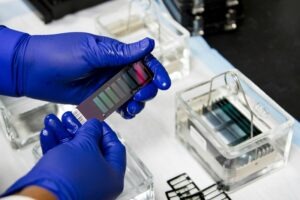GSK has received orphan drug designation (ODD) from the US Food and Drug Administration (FDA) for its B-cell inhibiting monoclonal antibody Benlysta (belimumab) to potentially treat systemic sclerosis (SSc).

Initially, the FDA approved GSK’s Benlysta to treat active systemic lupus erythematosus. Credit: GSK plc.
Subscribe to our email newsletter
Initially, the FDA approved Benlysta for the treatment of active systemic lupus erythematosus (SLE).
GSK noted that it is the first and only approved biologic for SLE as well as lupus nephritis (LN) in over 50 years, including for the paediatric patients.
Benlysta is a B-lymphocyte stimulator (BLyS) specific inhibitor that attaches to soluble BLyS, which is found to be high in patients with systemic autoimmune diseases such as SLE and LN.
The antibody inhibits the prolonged survival of B cells induced by increased BLyS, including autoreactive B cells.
Additionally, it reduces B cells differentiation into immunoglobulin-producing plasma cells.
In the first half of this year, GSK plans to initiate a Phase II/III trial of belimumab for systemic sclerosis associated interstitial lung disease (SSc-ILD).
The rare autoimmune disease SSc causes atypical growth of connective tissues and can affect the heart, lungs, musculoskeletal system, kidneys, skin, and other organs of the body.
At present there are limited treatment options available for SSc-ILD.
The orphan drug designation reflects the need to carry out further research and the potential for the antibody for addressing a critical need of people with this condition.
GSK also received the FDA approval for its oral hypoxia-inducible factor prolyl hydroxylase inhibitor Jesduvroq (daprodustat) to treat anaemia due to chronic kidney disease (CKD) in adult patients who have been receiving dialysis for at least four months.
 Advertise With UsAdvertise on our extensive network of industry websites and newsletters.
Advertise With UsAdvertise on our extensive network of industry websites and newsletters.
 Get the PBR newsletterSign up to our free email to get all the latest PBR
news.
Get the PBR newsletterSign up to our free email to get all the latest PBR
news.

